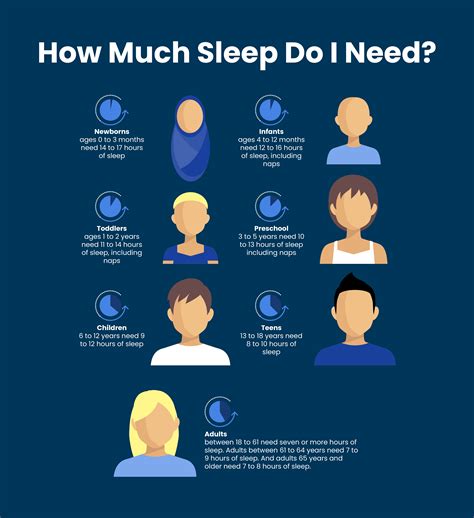Introduction
Sleep is essential for our physical and mental health. It allows our bodies to repair themselves, our minds to process information, and our emotions to regulate. So how much sleep do we actually need a day?

The Optimal Amount of Sleep
The National Sleep Foundation recommends that adults aged 18-64 get 7-9 hours of sleep per night. However, the optimal amount of sleep can vary from person to person. Some people may need more or less sleep than the recommended amount.
Factors That Affect Sleep Needs
There are a number of factors that can affect how much sleep we need, including:
- Age: As we get older, we tend to need less sleep.
- Gender: Women typically need more sleep than men.
- Activity level: People who are more active tend to need more sleep.
- Stress: Stress can make it difficult to fall asleep and stay asleep.
- Medications: Some medications can interfere with sleep.
- Medical conditions: Some medical conditions, such as insomnia, can make it difficult to get enough sleep.
The Benefits of Sleep
Getting enough sleep has a number of benefits, including:
- Improved physical health: Sleep helps us to repair our cells and tissues, strengthen our immune system, and reduce our risk of chronic diseases such as heart disease, stroke, and diabetes.
- Improved mental health: Sleep helps us to improve our mood, reduce stress, and improve our cognitive function.
- Increased productivity: Sleep helps us to think more clearly, make better decisions, and be more productive at work and at school.
- Improved safety: Sleep helps us to stay alert and avoid accidents.
The Consequences of Sleep Deprivation
Not getting enough sleep can have a number of negative consequences, including:
- Increased risk of accidents: Sleep deprivation can make us more likely to make mistakes and get into accidents.
- Impaired cognitive function: Sleep deprivation can make it difficult to think clearly, make decisions, and remember things.
- Increased risk of chronic diseases: Sleep deprivation can increase our risk of developing chronic diseases such as heart disease, stroke, and diabetes.
- Poor mood: Sleep deprivation can make us feel tired, irritable, and depressed.
How to Get a Good Night’s Sleep
There are a number of things you can do to improve your sleep, including:
- Establish a regular sleep schedule: Go to bed and wake up at the same time each day, even on weekends.
- Create a relaxing bedtime routine: Wind down before bed by doing relaxing activities such as reading, taking a warm bath, or listening to calming music.
- Make sure your bedroom is dark, quiet, and cool: These conditions are ideal for sleep.
- Avoid caffeine and alcohol before bed: These substances can interfere with sleep.
- Get regular exercise: Exercise can help you to sleep better at night.
- Avoid smoking: Smoking can make it harder to fall asleep.
- See a doctor if you have trouble sleeping: If you have trouble sleeping, see a doctor to rule out any underlying medical conditions.
Conclusion
Getting enough sleep is essential for our health and well-being. By following the tips above, you can improve your sleep and reap the many benefits that it has to offer.
FAQs
Q: How much sleep do I need?
A: The National Sleep Foundation recommends that adults aged 18-64 get 7-9 hours of sleep per night. However, the optimal amount of sleep can vary from person to person.
Q: What are the benefits of sleep?
A: The benefits of sleep include improved physical health, improved mental health, increased productivity, and improved safety.
Q: What are the consequences of sleep deprivation?
A: The consequences of sleep deprivation include increased risk of accidents, impaired cognitive function, increased risk of chronic diseases, and poor mood.
Q: How can I get a good night’s sleep?
A: You can improve your sleep by establishing a regular sleep schedule, creating a relaxing bedtime routine, making sure your bedroom is dark, quiet, and cool, avoiding caffeine and alcohol before bed, getting regular exercise, avoiding smoking, and seeing a doctor if you have trouble sleeping.
















